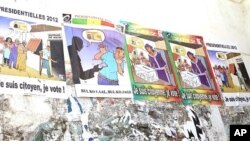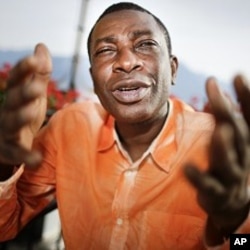Senegal’s controversial election race begins in earnest this week as the Constitutional Council decides which candidates are eligible to run in the February 26 poll.
During the next few weeks a parade of candidates will challenge Abdoulaye Wade, Senegal's aging, but determined incumbent president.
This week, the Constitutional Council will decide the validity of the presidential candidates, including Wade's bid for a third term, in the February 26 election.
Dakar’s walls and bridges are splattered with political graffiti and ragged campaign posters - alternately pasted up by one party and destroyed by another. Billboards ask people not to accept bribes for votes, "don’t touch, don’t approach," they advise. Citizens hold animated political discussions at coffee stands, on buses and at the beach.
Much controversy surrounds the question of whether President Wade, who at 85 is one of the world’s oldest heads of state, should stand for a third term. He was first elected in 2000 for seven years and re-elected in 2007 for five years - after a constitutional reform that also limited presidents to two terms.
But Wade has become deeply unpopular for trying to cling to power against the constitutional rules. There were unprecedented riots in June when he tried to force through a bill allowing a presidential candidate to win with just 25 percent of the vote. The popular uprising forced the president to back down.
Pop star Youssou N'Dour, an announced presidential candidate, says that like many of his countrymen he believes Wade’s run for re-election is unconstitutional. He has called for the international community to put pressure on the president to stand down.
N'Dour says Senegal is a window to democracy, but there is someone trampling the constitution underfoot. He says many people are trying to make a new Africa, one that respects human rights, fights against poverty and has good governance, but they are in real danger of losing democracy.
The opposition to President Wade’s Senegalese Democratic Party has been fragmented and disorganized, with more than 15 candidates announcing they will run for president. Voters are unaware of many of them, and certainly undecided as to how to use their vote.
Among the most visible opposition candidates are Macky Sall and Idrissa Seck, both former SDP politicians and prime ministers. Tanor Dieng, the head of the socialist party, is another front runner. Moustapha Niasse, also a former prime minister, heads up the main opposition coalition Benno Siggil Senegal.
Wild card candidates include Youssou N'Dour, virtual unknown Elhadj Diouf and teacher Ibrahima Fall, whom many mention as a favorite, but without the high-profile backing of some.
Candidates must deposit approximately $140,000 as a presidential fee, but need around three times that amount to undertake a credible campaign.
Babacar Dienne, a 42-year-old lifeguard, says he is waiting for the candidates to be validated before he decides who to vote for.
"I was a democrat," he says, "and voted for Wade in the past, but now he is too old to be a candidate." Dienne says he has not chosen, but might vote for an opposition candidate.
Mamadou Lamenbye, 44, is unemployed and says people want change in Senegal because life is such a struggle.
He says it is a struggle to survive in Senegal because of the system and if the people at the top actually bothered to look at what is really happening, they would realize this. He says they need to reduce the price of basics, so everyone can afford to buy themselves a kilo of rice.
Hip hop artists have stepped up to speak out for Senegal’s youth - frustrated by widespread poverty, soaring food and fuel prices, power cuts, and dire unemployment levels.
Popular singers are believed to have influenced voters to oust longtime president Abdou Diouf in 2000 and elect Wade.
Now history is repeating itself, and rappers berate the elderly president for failing to understand a discontented generation. Rapper KT, 35, is one of Dakar’s leading hip hop artists.
“This verse is about unemployment here, reminding the youth that no matter what, we are part of this country and we really have to stand and reach our goals, " KT explains, "no matter what the difficulties are and what the government is not doing for us, we have to get up, get out, and get something.”
But KT says many candidates are simply not high profile enough to stand a chance of winning.
“There are some who stand out - but I think Senegalese people in general are not ready to vote for those people because they do not really know them," he says. "There is someone like Ibrahima Fall who represents an alternative to the bunch of traditional politicians - but he is not expressing himself enough and not getting well-known enough. In reality I think it will be a tough choice.”
But national assembly deputy Amadou Dirade believes Wade is listening to the country’s youth.
He says the president understands Senegal's youth very well. He says as one of the youngest deputies in Senegal he believes the country's leaders think of young people from all levels of society. Dirade says he incontestably supports Wade, who he says has done amazing things to help us become a dignified, serious Africa, which Senegal is proud of.
The final list of candidates will be decided on January 29.














